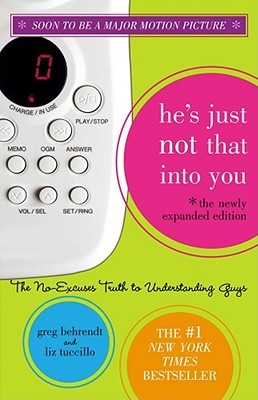 Everyone can use a daily wake-up call.
Everyone can use a daily wake-up call.
Now in bite-size mantras, the abridged empathetic wit and wisdom of the number one New York Times bestseller He’s Just Not That Into You will recharge and inspire your dating outlook one wake-up call at a time.
For ages women have come together over coffee, cocktails, or late-night phone chats to analyze the puzzling behavior of men. Greg Behrendt and Liz Tuccillo are here to say that despite good intentions you’re wasting your time. Men are not complicated, although they’d like you to think they are. And there are no mixed messages.
The truth may be, He’s just not that into you.
He’s Just Not That Into You based on a popular episode of Sex and the City educates otherwise smart women on how to tell when a guy just doesn’t like them enough, so they can stop wasting time making excuses for a dead-end relationship. This book knows you’re a beautiful, smart, funny woman who deserves better.
REVIEW:
I like reading texts that are feminist in nature. I expected (hoped for?) a book that served to empower women in their relationships, a book that addressed historical deficiencies in the way women are culturally taught to function in relationships or the way that a woman may prevent a man from stifling her natural motion in romance. As a true feminist or pop-feminist text I wanted to feel that a woman, after having sifted through the pages, would be better equipped to dismantle cultural blockades that prevent her from feeling complete latitude in a coupling.
Instead, I found a book that rallies women without suggesting a pathway that would lead to bona fide differences in their relationships with men. In fact, I found the text to be quite anti-feminist in its deeper doctrines. Rather than empowering women to promote real change in their relational positioning, it diminishes males into simplistic characters that emanate one of two relationship signals: I’m interested, or I’m not (but most likely I’m not). Doing so, more times than not, seems to cause women to opt out of relationships early on rather than deal with any uncertainty on the part of others.
It seems to me that the major fallacy of the book is its assumption that sex drives the man. Given this presupposition, perhaps the book is accurate—“he’s not that into you” could easily be replaced by “he’s transitioning to his next sexual conquest” and the book would make more sense. It makes more sense because sex is a yes or no thing. But if the reality is that men are searching for more than just sex and seek meaningful relationships, it seems difficult to accept the notion that a single indicator, such as phone call rates, can essentialize all that a man is thinking and feeling about a relationship. A relationship is not a yes or no thing. It is dynamic and develops over time. What may be scattered and uncertain at first can build into… a fortress of love, as Sting puts it.
I see the appeal—relationships are tough, and its therapeutic to gather around the warmth of an idea that consuls the heart. But it seems the book takes advantage of the realization that emotionally it’s easier to be out of a relationship that it is to be working in one, it’s easier to give up on a relationship than engage the complexities and uncertainties that come with falling in love—and in that, the book secretly delivers its hemlock.
Don’t get me wrong, I’m all about traditional notions of chivalry. It gives relationships momentum. But I think it is meant to be dynamic, and just because a guy is understand his feelings before moving along the commitment gradient, doesn’t mean that chivalry is lacking. That’s a totally incomplete thought, but it’s a bit tangential and this post is getting long…
The book is certainly fun and upbeat. I enjoyed its format and thought the authors did a good job at engaging their audience with familiar, quirky experiences to which any of us can easily relate. I was unintentionally entertained at many points too… I loved that the surveys included at the end of each chapter—the ones where 100% of the respondents agreed with the authors 100% of the time—were conducted by emailing a handful of the authors’ friends and asking them questions like, “Don’t you think it’s good for people to be happy?” and concluding “100% of respondents believe that if he’s a little bit grumpy after taking his med school finals, he’s just not that into you.”
I’ll be the first to admit that the text was not intended to be deep or really engage in feminist rhetoric—it’s actually an easy read and only took about an hour of one leg of my trip. But even as a pop-text, I think there’s opportunity to advance the position of women, or, at the very least, not detract from any momentum women maintain.
You can Read More In-Depth Book Reviews at my author page at GoodReads.com – Touch Here


